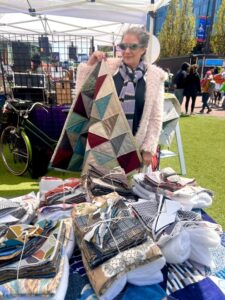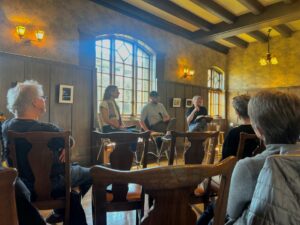Connecting with the women of a birthing center in the South Bronx was important for Jennifer Dohrn. While finding the 12 women she would interview for her book she made it a point to prioritize their time and ensure their comfort.
“When they finished, they felt like they had been able to think back and reprocess a whole period of time in their lives and claim it again,” Dohrn said. “It’s like having a reminder, I did do that. And I do have a voice. And it’s guided me ever since.”
Dohrn, a University of Chicago graduate, always knew that she wanted to be a midwife and made it her life’s commitment to serve the underprivileged women who didn’t have access to good healthcare.
In the first chapter of her book, “Mothers, Midwives, and Reimagining Birthing in the South Bronx: Breathe, Now Push,” Dohrn writes of a situation impacting mothers in the Global South as well as in the United States: a lack of maternal healthcare.
Dohrn and her late husband were heavily involved in the anti-apartheid movement in the 1990’s. At a time of major political reform, HIV/AIDS diagnosis rates climbed steadily, disproportionately affecting expectant mothers of color who are often overlooked due to various economic inequalities.
After returning to South Africa in 2003 under a new government, Dohrn witnessed the devastating impact of the HIV/AIDS epidemic on pregnant women. In the clinic where Dohrn worked, 59% of pregnant women were being diagnosed with HIV. Historically, the Global South has suffered from a shortage of trained health professionals who aid in childbirth and pregnancy, or midwives.
“Having my own children at home really solidified for me the belief that birth is a healthy and empowering experience for a woman and her family in that community,” said Dohrn. “This was not what was happening in this country or the Global South. But whatever I could do with these skills and knowledge that was who I was going to serve.”
Expanding her research, Dohrn immersed herself in her work, learning what needed to be changed in nursery and midwifery education. Her journey as a midwife and activist continued to inspire her work back home.
Maternal death rates are increasing in the United States, surpassing those of other high-income countries.
“What you want is equitable care, that everyone has the same protocol and standard of care that you abide by,” said Jacqueline Hairston, an assistant professor specializing in maternal-fetal medicine at Northwestern Medicine. “Physicians are a limited resource and that’s where midwives come in and nurse practitioners and physician’s assistants who can be highly skilled in a certain specialty or subspecialty to help fill those gaps.”
Ruth Lubic, accompanied by Dohrn, established the first freestanding birthing center in an inner city in the South Bronx that reflected the communities and cultures of the women and families it served.
Seeing there wasn’t enough documentation about midwifery, Dohrn used her stories from 12 mothers from the Childbearing Center of Morris Heights to give context to the global maternal mortality crisis, serving as an academic contribution. Among the mothers highlighted in the book, most are women of color who recounted their experiences.
“I found afterward, I was ecstatic and so drained. Because I put everything into just creating the space for them,” said Dohrn. “In birth, a woman can be very exposed, vulnerable because the actual process of birth is opening,”
The process of writing the book was a transformative and collaborative one.
“We broke down these interviews into four groups, and then I would propose a way of introducing one theme and I’d send it to her and she’d say, ‘this is it, this sounds good,’ or she’d send it back and she’d say ‘this does not sound right at all rewrite this,’ and it was very collaborative,” said Caroline Hanschuh, a midwife at Columbia University who aided in making revisions for the book to be published. “I really loved it because I’ve always looked to her very much as a mentor and I admire her tremendously,”
As a professor and Assistant Dean of the Office of Global Initiatives at Columbia University, Dohrn applies her experiences working with mothers in the Global South as well as the South Bronx to her teaching.
“It’s why I respect the research of oral histories and evidence. I teach because of my experiences, as they shouldn’t just stay in me,” said Dohrn. “I teach because I have such a passion for injustice and the ability to provide, in this case, different health care. And I want to encourage that fire in students and how to then keep it burning.”







Be First to Comment